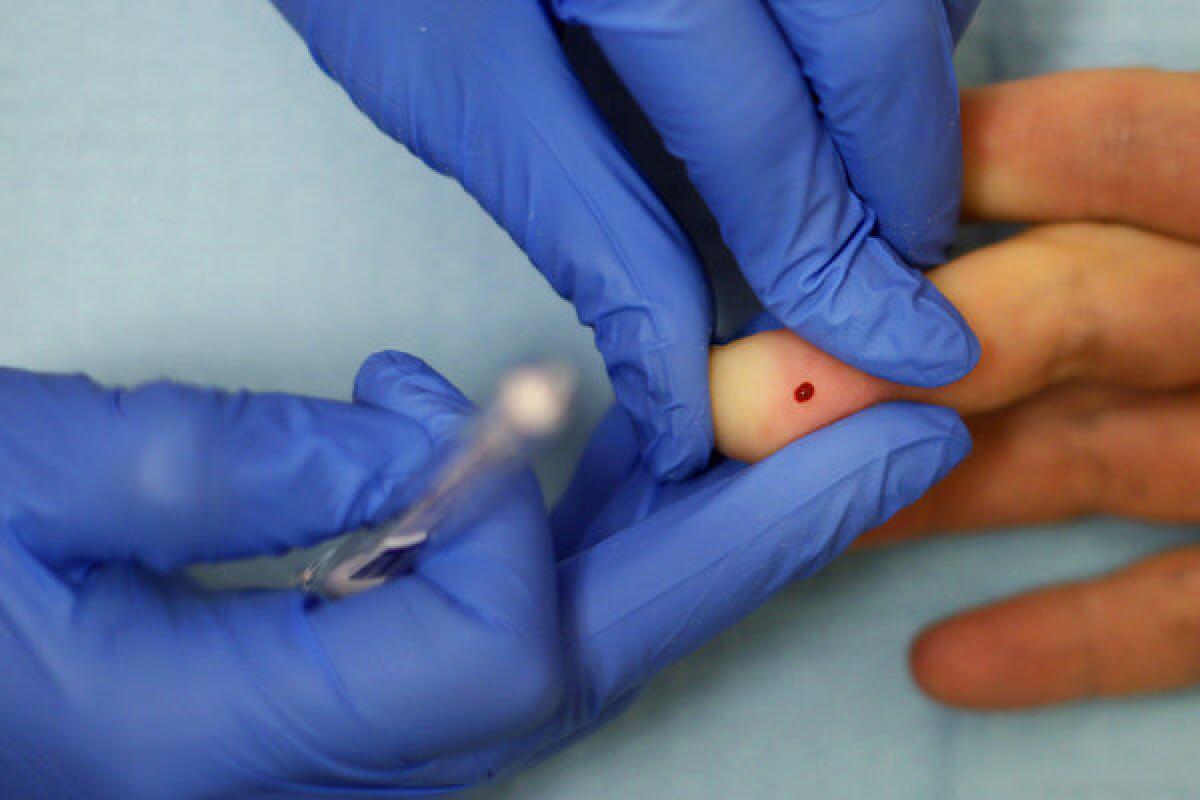HIV tests should be routine for most, Canada AIDS experts say

The push for routine screening for HIV infections is gathering heft.
Last week, the U.S. Preventive Services Task Force -- which advises the U.S. government and doctors on preventive medicine -- proposed that everyone ages 15 to 64 be offered an HIV test by doctors. The advice, which isn’t finalized, would replace older recommendations by the task force that HIV tests be offered just to those who are at high risk for catching the virus based on their sexual behavior, as well as all pregnant women.
Now two Canadian doctors are calling for similar routine screening in their country.
Their reasoning is much like that put forward by the U.S. task force:
-- A lot of infections are missed if doctors try to screen only high-risk patients (people aren’t always forthcoming about the details of their intimate private life). Infections are missed even in cases where patients have had a lot of exposure to the medical system through visits to physicians or hospitals for other medical matters.
-- Early identification means that patients will start treatment early, making it far more likely they’ll avoid HIV-related illnesses and live longer lives. The two doctors note in their editorial -- which was published in the Canadian Medical Assn. Journal, or CMAJ -- a 20-year-old diagnosed and then treated with cocktails of antiretroviral drugs can expect to live to age 73.
-- People who know they are infected with HIV will often change their sexual behavior toward less risky practices.
--When HIV-positive people are treated with antiretroviral drugs, the HIV counts in their bodies fall dramatically and transmission of the virus to uninfected partners drops by more than 95%.
All in all, the doctors write, “HIV meets the widely accepted principles for screening programs. Its treatment is accepted, accessible and highly cost-effective; its screening test is sensitive, specific and minimally invasive; and its early treatment has been well established as beneficial. ... It is therefore imperative to implement and evaluate routine HIV testing across Canada.”
The editorial was written by Dr. Reka Gustafson, medical director of communicable disease control for Vancouver Coastal Health, and Dr. Julio Montaner, director of the British Columbia Centre for Excellence in HIV/AIDS. It was coauthored by Barbara Sibbald, a CMAJ editor.
Neither these doctors nor the U.S. Preventive Services Task Force is suggesting anything radical. The Centers for Disease Control and Prevention has recommended routine HIV tests for ages 13 to 64 since 2006, with tests based on individual risk for those younger or older. Other groups endorsing routine screens in the U.S. include the American Academy of Pediatrics, American College of Physicians and the American Congress of Obstetricians and Gynecologists.
France recommends universal screening and Britain’s National Institute for Health and Clinical Excellence suggests physicians consider HIV tests for all new patients they enroll.
Among other benefits, doctors and public health experts cite the straightforwardness this approach offers: No longer must a physician try to assess whether a test is warranted for patient A or B based on that patient’s sexual behavior. Stigma dissipates too: If everyone gets the test, then it’s no longer a weird, embarassing or awkward thing to offer or request.
My own doctor has clearly been tracking the evolving thought about all this. Not long ago, I went for a check-up and he calmly suggested the test and I said “Sure” and I had it and all was well. It didn’t feel awkward. It was just routine, like a cholesterol test or for that matter a mammogram – a test for which there’s a lot more debate regarding relative risks and benefits.



